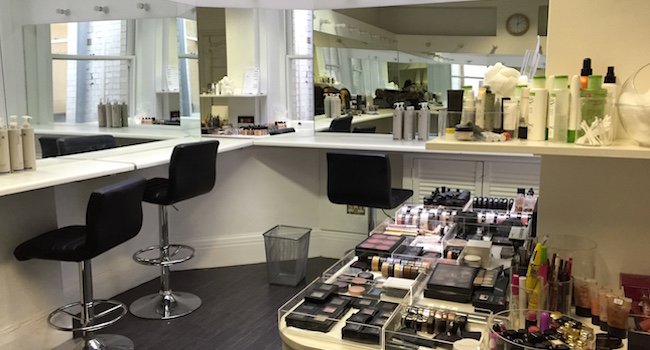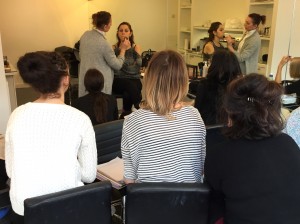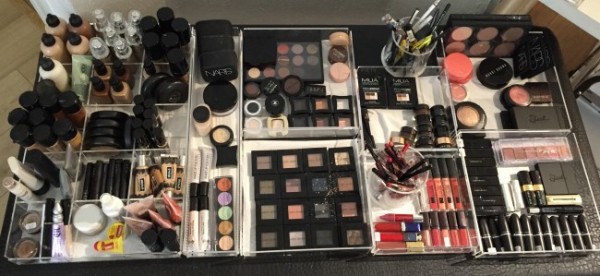
18 Apr FEATURE: What YouTube Cannot Teach – The Profession Of A Make-Up Artist
In 2014, YouTube and its stars erupted. From Zoe Sugg, a.k.a. Zoealla, with seven million subscribers through to Fleur Bell, a.k.a. Fleur De Force, British YouTube beauty gurus are more successful and admired than ever before. Not only do they provide fashion advice and present the latest make-up products, but they also show how to create the perfect look. So, in times of the Internet and its tutorials, are professional make-up artists still needed? I visited professionals of the industry to take a look at what YouTube cannot teach and if make-up schools are still required. by Monique Mehler
 One example of high-quality cosmetics courses is the London School of Make-Up, located in central London. From a two-day foundation course, up to an eight-week photographic and media course, all sorts of certificates and qualifications can be gained. Make-up artist Aga Borowa has twelve years of experience in the industry, is a retail expert for KIKO MILANO cosmetics and occasionally teaches classes at the London School of Make-Up. Whilst applying foundation to one of the students, she talks about her beginnings in the business. With a growing passion for mascara, blushes and lipsticks at the age of 23, Aga Borowa decided to attend the London College of Fashion to properly study the techniques of applying make-up to herself. Back then Borowa also learned from the experts of MAC Cosmetics, which nowadays stand for one of the most popular manufacturers of cosmetics worldwide. Asking her what she thinks only a make-up artist can teach, her answer is straight-forward and distinct:
One example of high-quality cosmetics courses is the London School of Make-Up, located in central London. From a two-day foundation course, up to an eight-week photographic and media course, all sorts of certificates and qualifications can be gained. Make-up artist Aga Borowa has twelve years of experience in the industry, is a retail expert for KIKO MILANO cosmetics and occasionally teaches classes at the London School of Make-Up. Whilst applying foundation to one of the students, she talks about her beginnings in the business. With a growing passion for mascara, blushes and lipsticks at the age of 23, Aga Borowa decided to attend the London College of Fashion to properly study the techniques of applying make-up to herself. Back then Borowa also learned from the experts of MAC Cosmetics, which nowadays stand for one of the most popular manufacturers of cosmetics worldwide. Asking her what she thinks only a make-up artist can teach, her answer is straight-forward and distinct:
”You will be confronted with different faces, different eyes and then do your best to get the most out of it by shaping and defining with make-up.”
Later Aga Borowa adds that it is the experience that brings you forward and that only a professional make-up artist can give confident advice. “Clients think they know what looks good but they actually might not. But this is where confidence plays in and you go: ‘Listen honey, this is the look, and this is how it needs to be done, and that’s it.’ However you present your opinion as an artist, they will listen to you,” Borowa explains.
Lisa Tonn only graduated from the London School of Make-Up last year and managed to work her way up to a successful freelance make-up artist in a very short period of time. Not only did she covered photo shootings with Toni & Guy, but also worked at events like X Factor, the BBC Music Awards and the Brit Awards. In the studio she works in, Lisa talks about her first experience with maquillage and how much she actually accords to the hype around make-up tutorials online: “When I was 14, I started watching YouTube videos. I remember watching a few girls sitting there talking about all this awesome make-up and I really got into it. But I only got very cheap stuff and two terrible make-up brushes. Then sitting in my room, I started trying different colours and looks,” Lisa says and points towards all the vibrant colours of eyeshadow in her kit. For the future she hopes to work with even more famous people and gain even more experience. Lisa’s absolute dream job would be doing the make-up of songstress Florence Welch or actress Scarlett Johansson.

“I gained real experience, practicing on different people and their different face shapes. It was not as professional as it is now, but it got me started in getting the hang of the techniques.” – Lisa Tonn
Even though Lisa found inspiration on YouTube and used to watch tutorials, she agrees with Aga Borowa. Some things just cannot be taught by beauty gurus when it comes to different techniques and facial structures. Elisabetta Nuvoli, who is a current student at the London School of Make-Up, also thinks that make-up courses still have their place in the world:
“I have always watched make-up tutorials, but even if today everyone can learn how to do make-up by watching videos on YouTube, I still believe that none of those videos can give the full and complete tutorial that a professional school provides.”
In the end, what differentiates real artists from people who try and teach on YouTube is their experience and expertise. The fact is that YouTube, its gurus and their legions of loyal fans will remain hyped and loved. But make-up fans who want to acquire serious skills and not just practise on themselves should consider learning from professionals like Aga Borowa.

